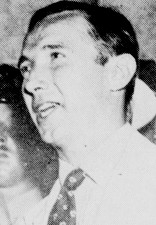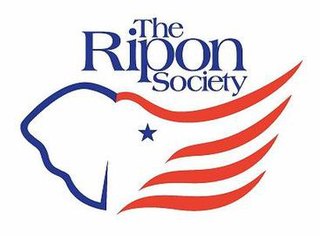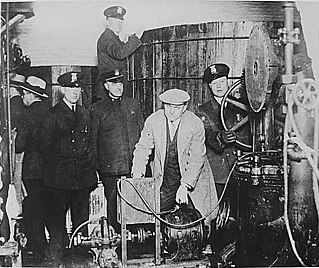
The temperance movement is a social movement against the consumption of alcoholic beverages. Participants in the movement typically criticize alcohol intoxication or promote complete abstinence (teetotalism), with leaders emphasizing alcohol's negative effects on health, personality, and family life. Typically the movement promotes alcohol education as well as demands new laws against the selling of alcohols, or those regulating the availability of alcohol, or those completely prohibiting it. During the 19th and early 20th centuries, the temperance movement became prominent in many countries, particularly English-speaking and Scandinavian ones, and it led to Prohibition in the United States from 1920 to 1933.

The Woman's Christian Temperance Union (WCTU) is an active international temperance organization that was among the first organizations of women devoted to social reform with a program that "linked the religious and the secular through concerted and far-reaching reform strategies based on applied Christianity." It was influential in the temperance movement, and supported the 18th Amendment. It was also influential in social reform issues that came to prominence in the progressive era.

Frank Gelett Burgess was an artist, art critic, poet, author and humorist. An important figure in the San Francisco Bay Area literary renaissance of the 1890s, particularly through his iconoclastic little magazine, The Lark, he is best known as a writer of nonsense verse, such as "The Purple Cow", and for introducing French modern art to the United States in an essay titled The Wild Men of Paris. He was the author of the popular Goops books, and he coined the term blurb.

Marion Anthony Zioncheck was an American politician who served as a member of the United States House of Representatives from 1933 until his death. He represented Washington's 1st congressional district as a Democrat.
Henry Cogswell College is a former private institution of higher learning that was based in Washington state from 1979 to 2006. The college offered bachelor's and master's degrees in business administration, computer science, digital arts, electrical engineering, mechanical engineering, mechanical engineering technology, and professional management. It was named after temperance movement crusader Henry D. Cogswell. Historically, the college had an enrollment of 300 students that relied mainly on Boeing-related tuition.

The Ripon Society is an American centrist Republican public policy organization based in Washington, D.C. It produces The Ripon Forum, the U.S.'s longest running Republican thought and opinion journal, as well as The Ripon Advance, a daily news publication.

Tompkins Square Park is a 10.5-acre (4.2 ha) public park in the Alphabet City portion of East Village, Manhattan, New York City. The square-shaped park, bounded on the north by East 10th Street, on the east by Avenue B, on the south by East 7th Street, and on the west by Avenue A, is abutted by St. Marks Place to the west.

A bubbler also called a drinking fountain or water fountain, is a fountain designed to provide drinking water. It consists of a basin with either continuously running water or a tap. The drinker bends down to the stream of water and swallows water directly from the stream. Modern indoor drinking fountains may incorporate filters to remove impurities from the water and chillers to lower its temperature. Drinking fountains are usually found in public places, like schools, rest areas, libraries, and grocery stores. Many jurisdictions require drinking fountains to be wheelchair accessible, and to include an additional unit of a lower height for children and short adults. The design that this replaced often had one spout atop a refrigeration unit.

Washington Park is a small public, urban park located in Downtown Dubuque, Iowa, United States. The park encompasses an entire city block, bordered on the north by West 7th Street, on the west by Bluff Street, on the south by West 6th Street, and on the east by Locust Street. The park is located between the city's post office and the Dubuque Museum of Art.

The Metropolitan Drinking Fountain and Cattle Trough Association was an association set up in London by Samuel Gurney, a Member of Parliament, and philanthropist and Edward Thomas Wakefield, a barrister, in 1859 to provide free drinking water.

The Temperance Fountain is a fountain and statue located in Washington, D.C., donated to the city in 1882 by Henry D. Cogswell, a dentist from San Francisco, California, who was a crusader in the temperance movement. This fountain was one of a series of temperance fountains he designed and commissioned in a belief that easy access to cool drinking water would keep people from consuming alcoholic beverages.

The Washington Legal Foundation (WLF) is a non-profit legal organization located at 2007-2009 Massachusetts Avenue NW, on Embassy Row in Washington, D.C. Founded in 1977, the Foundation's stated goal is "to defend and promote the principles of freedom and justice." The organization promotes pro-business and free-market positions and is widely perceived as conservative. WLF addresses a range of legal matters, including commercial free speech, corporate criminal liability, environmental regulation, food and drug law, health care, and intellectual property.
Sigourney Thayer was an American theatrical producer, World War I aviator, and poet.
A temperance fountain was a fountain that was set up, usually by a private benefactor, to encourage people not to drink beer by the provision of safe and free water. Beer was the main alternative to water, and generally safer. The temperance societies had no real alternative as tea and coffee were too expensive, so drinking fountains were very attractive.

Prohibition in the United States was a nationwide constitutional ban on the production, importation, transportation, and sale of alcoholic beverages from 1920 to 1933.

The Temperance movement in the United States is a movement to curb the consumption of alcohol. It had a large influence on American politics and society in the nineteenth and twentieth centuries. Today, there are organizations that continue to promote the cause of temperance.
This is a history and list of drinking fountains in the United States. A drinking fountain, also called a water fountain or bubbler, is a fountain designed to provide drinking water. It consists of a basin with either continuously running water or a tap. The drinker bends down to the stream of water and swallows water directly from the stream. Drinking water fountains are most commonly found in heavy usage areas like public amenities, schools, airports, and museums.

Teetotalism is the practice or promotion of complete personal abstinence from alcoholic beverages. A person who practices teetotalism is called a teetotaler or is simply said to be teetotal. The teetotalism movement was first started in Preston, England, in the early 19th century. The Preston Temperance Society was founded in 1833 by Joseph Livesey, who was to become a leader of the temperance movement and the author of The Pledge: "We agree to abstain from all liquors of an intoxicating quality whether ale, porter, wine or ardent spirits, except as medicine."

Benjamin Franklin – also known as the Benjamin Franklin Memorial, Benjamin Franklin Statue and Cogswell Historical Monument – is an outdoor sculpture in Washington Square, San Francisco, California.














